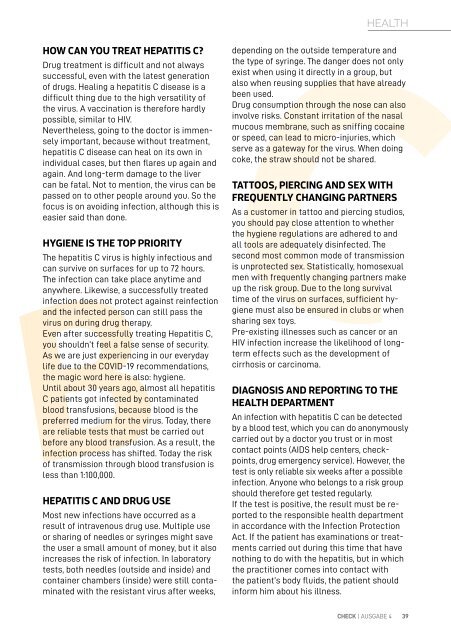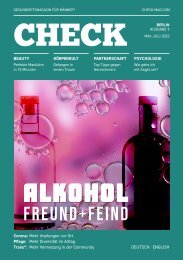CHECK Magazin - Gesundheitsmagazin für Männer No.4
Die Verschmutzung des Planeten findet aber auch im Kleinen statt und betrifft uns ganz direkt. Denn täglich nehmen wir unzählige Gifte durch die Nahrung, Kosmetik oder Alltagsgegenstände in uns auf. Welches sind die größten Gefahren und wie kann man sich im Alltag davor schützen?
Die Verschmutzung des Planeten findet aber auch im Kleinen statt und betrifft uns ganz direkt. Denn täglich nehmen wir unzählige Gifte durch die Nahrung, Kosmetik oder Alltagsgegenstände in uns auf. Welches sind die größten Gefahren und wie kann man sich im Alltag davor schützen?
Erfolgreiche ePaper selbst erstellen
Machen Sie aus Ihren PDF Publikationen ein blätterbares Flipbook mit unserer einzigartigen Google optimierten e-Paper Software.
HEALTH<br />
HOW CAN YOU TREAT HEPATITIS C?<br />
Drug treatment is difficult and not always<br />
successful, even with the latest generation<br />
of drugs. Healing a hepatitis C disease is a<br />
difficult thing due to the high versatility of<br />
the virus. A vaccination is therefore hardly<br />
possible, similar to HIV.<br />
Nevertheless, going to the doctor is immensely<br />
important, because without treatment,<br />
hepatitis C disease can heal on its own in<br />
individual cases, but then flares up again and<br />
again. And long-term damage to the liver<br />
can be fatal. Not to mention, the virus can be<br />
passed on to other people around you. So the<br />
focus is on avoiding infection, although this is<br />
easier said than done.<br />
HYGIENE IS THE TOP PRIORITY<br />
The hepatitis C virus is highly infectious and<br />
can survive on surfaces for up to 72 hours.<br />
The infection can take place anytime and<br />
anywhere. Likewise, a successfully treated<br />
infection does not protect against reinfection<br />
and the infected person can still pass the<br />
virus on during drug therapy.<br />
Even after successfully treating Hepatitis C,<br />
you shouldn‘t feel a false sense of security.<br />
As we are just experiencing in our everyday<br />
life due to the COVID-19 recommendations,<br />
the magic word here is also: hygiene.<br />
Until about 30 years ago, almost all hepatitis<br />
C patients got infected by contaminated<br />
blood transfusions, because blood is the<br />
preferred medium for the virus. Today, there<br />
are reliable tests that must be carried out<br />
before any blood transfusion. As a result, the<br />
infection process has shifted. Today the risk<br />
of transmission through blood transfusion is<br />
less than 1:100,000.<br />
B<br />
HEPATITIS C AND DRUG USE<br />
Most new infections have occurred as a<br />
result of intravenous drug use. Multiple use<br />
or sharing of needles or syringes might save<br />
the user a small amount of money, but it also<br />
increases the risk of infection. In laboratory<br />
tests, both needles (outside and inside) and<br />
container chambers (inside) were still contaminated<br />
with the resistant virus after weeks,<br />
C<br />
depending on the outside temperature and<br />
the type of syringe. The danger does not only<br />
exist when using it directly in a group, but<br />
also when reusing supplies that have already<br />
been used.<br />
Drug consumption through the nose can also<br />
involve risks. Constant irritation of the nasal<br />
mucous membrane, such as sniffing cocaine<br />
or speed, can lead to micro-injuries, which<br />
serve as a gateway for the virus. When doing<br />
coke, the straw should not be shared.<br />
TATTOOS, PIERCING AND SEX WITH<br />
FREQUENTLY CHANGING PARTNERS<br />
As a customer in tattoo and piercing studios,<br />
you should pay close attention to whether<br />
the hygiene regulations are adhered to and<br />
all tools are adequately disinfected. The<br />
second most common mode of transmission<br />
is unprotected sex. Statistically, homosexual<br />
men with frequently changing partners make<br />
up the risk group. Due to the long survival<br />
time of the virus on surfaces, sufficient hygiene<br />
must also be ensured in clubs or when<br />
sharing sex toys.<br />
Pre-existing illnesses such as cancer or an<br />
HIV infection increase the likelihood of longterm<br />
effects such as the development of<br />
cirrhosis or carcinoma.<br />
DIAGNOSIS AND REPORTING TO THE<br />
HEALTH DEPARTMENT<br />
An infection with hepatitis C can be detected<br />
by a blood test, which you can do anonymously<br />
carried out by a doctor you trust or in most<br />
contact points (AIDS help centers, checkpoints,<br />
drug emergency service). However, the<br />
test is only reliable six weeks after a possible<br />
infection. Anyone who belongs to a risk group<br />
should therefore get tested regularly.<br />
If the test is positive, the result must be reported<br />
to the responsible health department<br />
in accordance with the Infection Protection<br />
Act. If the patient has examinations or treatments<br />
carried out during this time that have<br />
nothing to do with the hepatitis, but in which<br />
the practitioner comes into contact with<br />
the patient‘s body fluids, the patient should<br />
inform him about his illness.<br />
<strong>CHECK</strong> | AUSGABE 4<br />
39


















